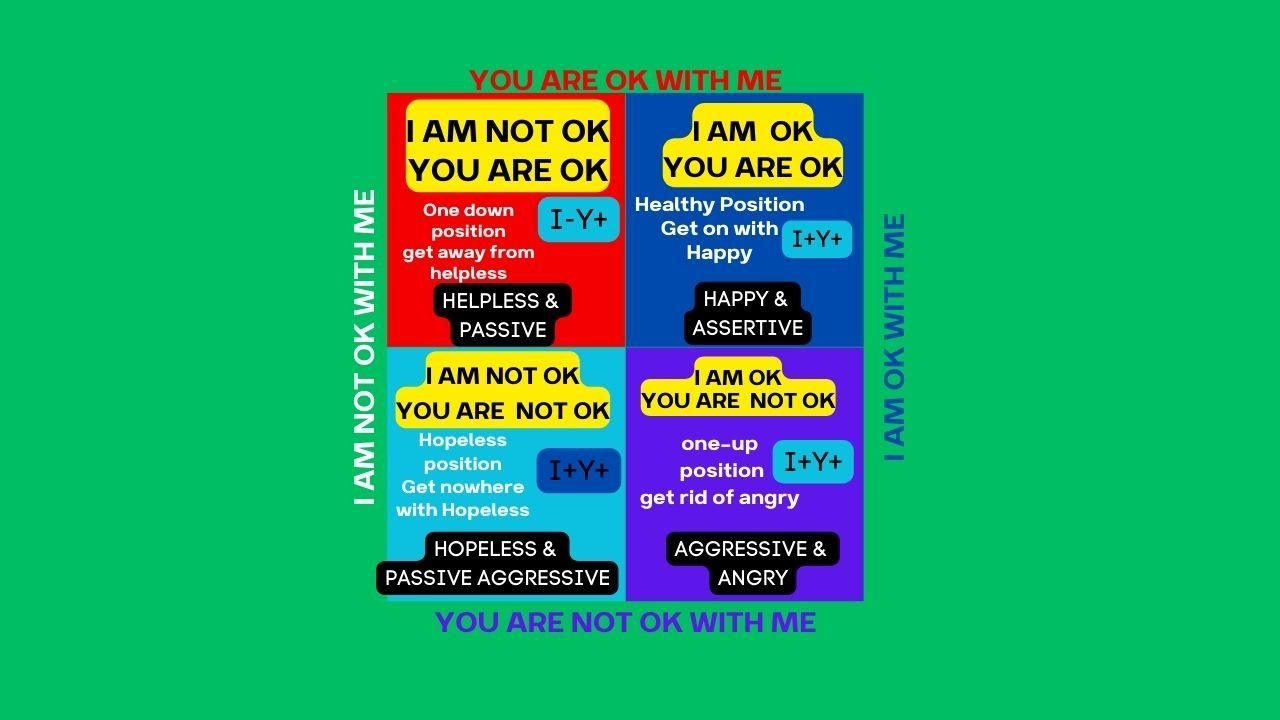Life Positions in Transactional Analysis: A Guide to I’m OK, You’re OK

Life Positions in Transactional Analysis
Exploring the four fundamental views of self and others
CERTIFIED SUICIDE PREVENTION GATEKEEPER – FIRST DAY TRAINING
Transactional Analysis (TA), a theory of personality and social interaction developed by Eric Berne, provides a powerful framework for understanding human behavior. A core concept within TA is the idea of Life Positions—fundamental beliefs we hold about ourselves and others that shape our interactions and life script.
The Four Life Positions
Berne identified four primary life positions, each representing a different combination of “I’m OK” and “You’re OK” beliefs.
1. I’m OK, You’re OK (The Healthy Position)
This is the healthiest and most desirable life position, based on a realistic acceptance of both your own and others’ inherent worth.
10 examples that reflect “I’m OK, You’re OK”:
- Actively listening to others and valuing their perspectives
- Being open to constructive criticism and feedback
- Expressing appreciation and gratitude towards others
- Collaborating and working as a team
- Respecting boundaries and personal space
- Being assertive without being aggressive
- Accepting responsibility for one’s actions and mistakes
- Showing empathy and offering support to others
- Being open-minded and willing to learn from others
- Recognizing and celebrating the strengths and achievements of others
2. I’m OK, You’re Not OK (The Arrogant Position)
Individuals in this position feel superior to others, often blaming and criticizing.
10 examples that reflect “I’m OK, You’re Not OK”:
- Belittling or demeaning others’ opinions or ideas
- Manipulating or controlling others for personal gain
- Ignoring or dismissing others’ feelings or needs
- Using aggressive or abusive language towards others
- Blaming others for one’s own mistakes or shortcomings
- Refusing to consider alternative viewpoints or perspectives
- Taking advantage of others’ vulnerabilities or weaknesses
- Engaging in power struggles or seeking dominance over others
- Displaying a lack of empathy or compassion towards others
- Undermining or sabotaging others’ efforts or achievements
3. I’m Not OK, You’re OK (The Helpless Position)
Characterized by feelings of inadequacy and dependence on others for approval.
10 examples that reflect “I’m Not OK, You’re OK”:
- Seeking constant reassurance and validation from others
- Putting others’ needs and desires above one’s own
- Feeling anxious or inferior in social or professional settings
- Apologizing excessively or taking blame for things that are not one’s fault
- Avoiding conflict or confrontation at all costs
- Being overly self-critical and focusing on one’s perceived flaws
- Comparing oneself unfavorably to others
- Being overly accommodating and sacrificing one’s own needs
- Feeling dependent on others for approval and validation
- Being afraid to assert one’s own opinions or preferences
4. I’m Not OK, You’re Not OK (The Hopeless Position)
A despairing stance where neither self nor others are perceived as OK, often leading to withdrawal.
Here the dialogue communicates that she is not ok without her lover, and you are not ok because you are understanding love — very futile position.
People who are in love should always be in the “I am OK and you are OK” position and try to live life always.
10 examples that reflect “I’m Not OK, You’re Not OK”:
- Feeling hopeless or resigned about personal and professional prospects
- Engaging in self-destructive behaviors or habits
- Isolating oneself from others and avoiding social interactions
- Being highly critical and judgmental towards oneself and others
- Expecting the worst outcome in every situation
- Feeling constant dissatisfaction and unhappiness
- Blaming oneself and others for life’s difficulties and challenges
- Engaging in negative self-talk and self-sabotaging behaviors
- Being suspicious and mistrustful of others’ intentions
- Withdrawing from relationships and avoiding emotional intimacy
How Life Positions Affect Our Lives
Understanding your dominant position is the first step toward growth. TA offers tools like script analysis and ego state work to shift toward mutual respect and problem‑solving.
